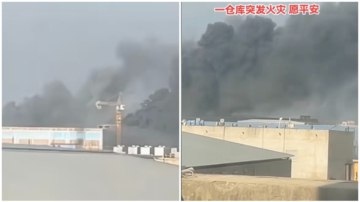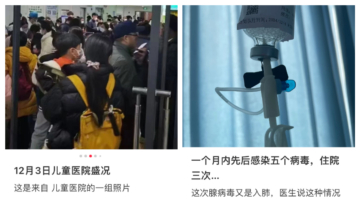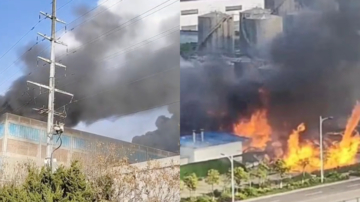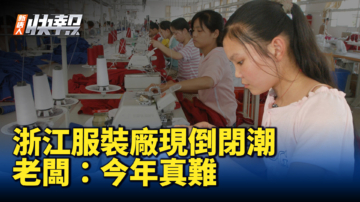【新唐人2013年06月19日讯】中共党刊《求是》杂志刊发评论文章,批评中国大陆互联网上充满所谓“负能量”,声称,网民网上的谩骂,“骂不倒党和政府”,作者还说,与其谩骂不如“断网”。但文章引发网民的跟贴炮轰,中共跟着急速删贴。评论说,这篇文章对网民是一种诬蔑,是中共想进一步控制人民的思想、言论,成为它驯服的工具。
6月17号,《求是》刊出“警惕网络负能量”的评论文章,内容说,互联网充斥着所谓的负面信息,凡是政府辟谣的就一定是事实,凡是官方发布的就一定有黑幕,凡是社会矛盾就一定是体制问题。
文章认为造成这种所谓“网络负能量”的成因:一是,网络媒体的炒作添油加柴﹔二是,特定人群的情绪宣泄﹔三是,某些“意见领袖”的蓄意鼓动﹔四是,“网络水军”的推波助澜。
文章批评网民的“人肉搜索”等行为,让越来越多的人谈网色变。宣称:网民应该明白:骂,骂不倒党和政府,与其沉溺于网络发泄不满、抱怨社会,不如断开网线,勤奋工作。作者还警告说,网上活跃份子在享有自由发言权的同时,必须为自己的言论承担责任。
这篇文章引出几万跟贴,同时炮声隆隆。不过,18号上午,各大媒体开始删贴。
时政评论员汪北稷指出,这篇文章发出的信号,是中共想进一步控制人民的思想,控制人民言论的自由、打压人民追求思想自由的空间,成为它驯服的工具。
时政评论员汪北稷:“它的标题就是恐吓性的,骂不倒它的党和政府,但是,请问:王义军叛逃到美国的领事馆、薄熙来犯罪的事实,这些难道是网民造成的吗?跟网络、人民的探讨空间有甚么关系呢?所以共产党本身的罪恶,它本身官员的贪腐,本身的独裁、镇压是它本身的邪恶机制造成的,网络正好是揭开共产党遮羞布的一个工具。”
汪北稷指出,近年来,网路揭露出来的贪官,从南京的“天价烟”局长,到陕西的“表(表)哥”、“表(表)叔”,再到广州的“房叔”、“房婶”,再到“雷政富不雅视频”引发重庆21名淫官落马。及最近,发改委副主任刘铁男涉贪、包养情妇被免职﹔以及中共中央办公厅官员范某性丑闻等,已经让中共贪官谈网色变。
而北京时政观察人士华颇认为,这篇文章代表了中共对网路的仇视﹔对民意,表现出一种死猪不怕开水烫,笑骂由他的态度﹔同时也表现出中共对网络失守的无奈。
北京时政观察人士华颇:“因为它看到网络世界上,官方的所谓‘正能量’,屡屡败于网络上的‘负能量’,(所以)官方要加强网络管制,对于网络的舆论不是引导,而是对负面舆论要坚决的制止。”
汪北稷指出,这篇文章的出台,和之前的“反宪政”等极“左”文章,一脉相承。
汪北稷:“那些文章从一定的高度来否定普世价值、否定打倒共产党的重要性,这篇文章从网路的角度来附和它,这是中共最近在思想领域向左转的一种标志,这个是反人民的、反人类的一种思想的表达,这个对大陆的网民是非常不公平的一种诬蔑,对网络的正面作用是一种否定。”
汪北稷认为,这是告诉千千万万个网民,中共非常恐惧网民对它的揭露、否定和批判,所以才要求网民断网,不要去看真相、追求真相、不要去退党、不要去翻墙,一切都听它的党话,做顺民、做奴隶。但是,汪北稷说,这篇文章同时也是鼓舞人们,网络民意,最终是推倒中共的浪潮。
采访编辑/李韵 后制/李勇
China's Communist Magazine Deletes Netizens' Criticism
The Chinese Communist Party's (CCP) Qiushi magazine
criticized the Internet as being full of “negative energy.”
The Qiushi article claimed that netizens' curses
won't make the CCP and its regime collapse.
The editor of the article suggested that rather than
verbal abuse, netizens should cease using the Internet.
Many netizens bombarded the article with comments
which were rapidly deleted by the CCP.
Analysts said that this article is slander of netizens,
and that the CCP intends to further control people's thinking
and speech so as to have them become tools of the regime.
On June 17, Qiushi issued an editorial article entitled,
“Vigilance towards the Internet's negative energy –
A rational view of cyberspace.”
The article claimed that the “negative information” propels
the ideas that any rumor denied by the government is certainly
factual and that there must be sinister motives behind
anything the authorities declare,
as well as that any social contradictions must be
the system's problem.
The article listed the cause of the negative energy as coming
from hype by the Internet media, special interests groups,
dissident leaders and fourthly, promotion by the Internet
Water Army (netizens who are paid to post online comments).
The article criticized netizens actions on “Human flesh search
engine” (which refers to massive research on blogs and forums).
It claimed that this negativity is causing increasingly
more people to fear the Internet.
The article said that netizens should be clear about the fact
that the CCP and regime won't be downed by cursing.
Rather than throw anger and complaints, netizens
should stop using the Internet and work hard, it said.
The editor warns that Internet activists who enjoy freedom
of speech should be responsible for their expression.
Several tens of thousands of comments followed the article.
However, on the morning of June 18, media began
to delete the comments.
Wang Beiji, a current affairs commentator, said that
the article was meant to send a message.
It shows the CCP intended to take further control over
people's minds and freedom of expression.
The CCP tries to tame people's minds
and suppress their freedom.
Wang Beiji: “The article's title is in a threatening style.
It mentioned that curses can't make the CCP regime collapse.
I want to ask, 'Wang Lijun's fleeing to the US consulate
and Bo Xilai's crimes, were these incidents created by netizens?
What are the connection between these incidents
and netizens' discussion?
Thus the CCP's crimes, its officials' corruption,
its dictatorship and suppression were caused by its evil system.
The Internet is a tool to unveil the CCP's evil nature.”
Wang said that in recent years, the network exposed
corruption such as Nanjing's Director-general of "sky-high price cigarette",
Shaanxi's “Watch-Wearing Brother,” “Watch-Wearing Brother,”
“Watch-Wearing Uncle,” “House Uncle,” and “House Aunty.”
Lei Zhengfu's sex tape caused the downfall
of 21 Chongqing officials.
Recently, Liu Tienan, a vice minister of the National
Development and Reform Commission was sacked for
accepting bribes and keeping mistresses, and Fan Yue,
a former director of the CCP General Office, was also involved in a sex scandal.
All these revelations caused the corrupt CCP officials
to be fearful of social networks.
Hua Po, Beijing current affairs observer, believes that
this article shows the CCP's hatred of the Internet.
The CCP responded to public opinion using the saying,
“to a dead pig, boiling water is nothing”;
while it also shows the CCP's failure to control the Internet.
Hua Po: “The CCP noticed its official 'positive energy'
on the Internet was often defeated by netizens' 'negative energy'.
Thus the CCP intensifies Internet control.
It didn't guide public opinion, but stopped
netizens' criticism.”
Wang Beiji said that the article has a similar tune of previous
“leftist” articles of the anti constitutional system.
Wang Beiji: “These articles from a certain high level deny
universal values and the importance of overthrowing the CCP.
This article echoes, from the Internet view, that the CCP
is currently turning to the “left”, which is against its people and human beings.
This behavior is unfair slander of netizens,
It is a denial of the positive effects of the network.”
Wang believes that it also tells millions of netizens
that the CCP is very fearful of its evil behavior being exposed, denied, and criticized by netizens.
Thus the CCP requests that netizens stop using the Internet,
don't look at the truth nor pursue the truth,
don't quit the CCP nor unblock its firewall, but only
listen to the CCP and be obedient citizens.
Wang said that this article in some way also inspires people
and the public opinion to tear down the CCP in the end.
6月17号,《求是》刊出“警惕网络负能量”的评论文章,内容说,互联网充斥着所谓的负面信息,凡是政府辟谣的就一定是事实,凡是官方发布的就一定有黑幕,凡是社会矛盾就一定是体制问题。
文章认为造成这种所谓“网络负能量”的成因:一是,网络媒体的炒作添油加柴﹔二是,特定人群的情绪宣泄﹔三是,某些“意见领袖”的蓄意鼓动﹔四是,“网络水军”的推波助澜。
文章批评网民的“人肉搜索”等行为,让越来越多的人谈网色变。宣称:网民应该明白:骂,骂不倒党和政府,与其沉溺于网络发泄不满、抱怨社会,不如断开网线,勤奋工作。作者还警告说,网上活跃份子在享有自由发言权的同时,必须为自己的言论承担责任。
这篇文章引出几万跟贴,同时炮声隆隆。不过,18号上午,各大媒体开始删贴。
时政评论员汪北稷指出,这篇文章发出的信号,是中共想进一步控制人民的思想,控制人民言论的自由、打压人民追求思想自由的空间,成为它驯服的工具。
时政评论员汪北稷:“它的标题就是恐吓性的,骂不倒它的党和政府,但是,请问:王义军叛逃到美国的领事馆、薄熙来犯罪的事实,这些难道是网民造成的吗?跟网络、人民的探讨空间有甚么关系呢?所以共产党本身的罪恶,它本身官员的贪腐,本身的独裁、镇压是它本身的邪恶机制造成的,网络正好是揭开共产党遮羞布的一个工具。”
汪北稷指出,近年来,网路揭露出来的贪官,从南京的“天价烟”局长,到陕西的“表(表)哥”、“表(表)叔”,再到广州的“房叔”、“房婶”,再到“雷政富不雅视频”引发重庆21名淫官落马。及最近,发改委副主任刘铁男涉贪、包养情妇被免职﹔以及中共中央办公厅官员范某性丑闻等,已经让中共贪官谈网色变。
而北京时政观察人士华颇认为,这篇文章代表了中共对网路的仇视﹔对民意,表现出一种死猪不怕开水烫,笑骂由他的态度﹔同时也表现出中共对网络失守的无奈。
北京时政观察人士华颇:“因为它看到网络世界上,官方的所谓‘正能量’,屡屡败于网络上的‘负能量’,(所以)官方要加强网络管制,对于网络的舆论不是引导,而是对负面舆论要坚决的制止。”
汪北稷指出,这篇文章的出台,和之前的“反宪政”等极“左”文章,一脉相承。
汪北稷:“那些文章从一定的高度来否定普世价值、否定打倒共产党的重要性,这篇文章从网路的角度来附和它,这是中共最近在思想领域向左转的一种标志,这个是反人民的、反人类的一种思想的表达,这个对大陆的网民是非常不公平的一种诬蔑,对网络的正面作用是一种否定。”
汪北稷认为,这是告诉千千万万个网民,中共非常恐惧网民对它的揭露、否定和批判,所以才要求网民断网,不要去看真相、追求真相、不要去退党、不要去翻墙,一切都听它的党话,做顺民、做奴隶。但是,汪北稷说,这篇文章同时也是鼓舞人们,网络民意,最终是推倒中共的浪潮。
采访编辑/李韵 后制/李勇
China's Communist Magazine Deletes Netizens' Criticism
The Chinese Communist Party's (CCP) Qiushi magazine
criticized the Internet as being full of “negative energy.”
The Qiushi article claimed that netizens' curses
won't make the CCP and its regime collapse.
The editor of the article suggested that rather than
verbal abuse, netizens should cease using the Internet.
Many netizens bombarded the article with comments
which were rapidly deleted by the CCP.
Analysts said that this article is slander of netizens,
and that the CCP intends to further control people's thinking
and speech so as to have them become tools of the regime.
On June 17, Qiushi issued an editorial article entitled,
“Vigilance towards the Internet's negative energy –
A rational view of cyberspace.”
The article claimed that the “negative information” propels
the ideas that any rumor denied by the government is certainly
factual and that there must be sinister motives behind
anything the authorities declare,
as well as that any social contradictions must be
the system's problem.
The article listed the cause of the negative energy as coming
from hype by the Internet media, special interests groups,
dissident leaders and fourthly, promotion by the Internet
Water Army (netizens who are paid to post online comments).
The article criticized netizens actions on “Human flesh search
engine” (which refers to massive research on blogs and forums).
It claimed that this negativity is causing increasingly
more people to fear the Internet.
The article said that netizens should be clear about the fact
that the CCP and regime won't be downed by cursing.
Rather than throw anger and complaints, netizens
should stop using the Internet and work hard, it said.
The editor warns that Internet activists who enjoy freedom
of speech should be responsible for their expression.
Several tens of thousands of comments followed the article.
However, on the morning of June 18, media began
to delete the comments.
Wang Beiji, a current affairs commentator, said that
the article was meant to send a message.
It shows the CCP intended to take further control over
people's minds and freedom of expression.
The CCP tries to tame people's minds
and suppress their freedom.
Wang Beiji: “The article's title is in a threatening style.
It mentioned that curses can't make the CCP regime collapse.
I want to ask, 'Wang Lijun's fleeing to the US consulate
and Bo Xilai's crimes, were these incidents created by netizens?
What are the connection between these incidents
and netizens' discussion?
Thus the CCP's crimes, its officials' corruption,
its dictatorship and suppression were caused by its evil system.
The Internet is a tool to unveil the CCP's evil nature.”
Wang said that in recent years, the network exposed
corruption such as Nanjing's Director-general of "sky-high price cigarette",
Shaanxi's “Watch-Wearing Brother,” “Watch-Wearing Brother,”
“Watch-Wearing Uncle,” “House Uncle,” and “House Aunty.”
Lei Zhengfu's sex tape caused the downfall
of 21 Chongqing officials.
Recently, Liu Tienan, a vice minister of the National
Development and Reform Commission was sacked for
accepting bribes and keeping mistresses, and Fan Yue,
a former director of the CCP General Office, was also involved in a sex scandal.
All these revelations caused the corrupt CCP officials
to be fearful of social networks.
Hua Po, Beijing current affairs observer, believes that
this article shows the CCP's hatred of the Internet.
The CCP responded to public opinion using the saying,
“to a dead pig, boiling water is nothing”;
while it also shows the CCP's failure to control the Internet.
Hua Po: “The CCP noticed its official 'positive energy'
on the Internet was often defeated by netizens' 'negative energy'.
Thus the CCP intensifies Internet control.
It didn't guide public opinion, but stopped
netizens' criticism.”
Wang Beiji said that the article has a similar tune of previous
“leftist” articles of the anti constitutional system.
Wang Beiji: “These articles from a certain high level deny
universal values and the importance of overthrowing the CCP.
This article echoes, from the Internet view, that the CCP
is currently turning to the “left”, which is against its people and human beings.
This behavior is unfair slander of netizens,
It is a denial of the positive effects of the network.”
Wang believes that it also tells millions of netizens
that the CCP is very fearful of its evil behavior being exposed, denied, and criticized by netizens.
Thus the CCP requests that netizens stop using the Internet,
don't look at the truth nor pursue the truth,
don't quit the CCP nor unblock its firewall, but only
listen to the CCP and be obedient citizens.
Wang said that this article in some way also inspires people
and the public opinion to tear down the CCP in the end.








